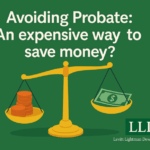
How to Avoid Probate Tax in Ontario Without Expensive Mistakes
August 29, 2025
The Executor’s Handbook: A Step-by-Step Guide to Estate Administration in Ontario
December 19, 2025Joint Tenancy vs. Tenants in Common in Ontario — What’s the Difference and Why It Matters
Owning Property Together in Ontario
When two or more people buy a property together in Ontario, the way ownership is structured has real legal and estate consequences. The two most common types of co-ownership are joint tenancy and tenancy in common.
While the difference might sound technical, it determines what happens to your share of the property if you pass away — and whether that share forms part of your estate.
What Is Joint Tenancy?
In a joint tenancy, all owners have an equal and undivided interest in the entire property. Most importantly, joint tenancy often includes the right of survivorship — meaning that when one owner dies, their share automatically passes to the surviving owner(s).
This transfer happens outside the estate, without probate or reference to a will. For example, when spouses purchase a home together, they often hold title as joint tenants so that the home automatically transfers to the surviving spouse.
What Is Tenancy in Common?
A tenancy in common allows each owner to hold a specific share of the property (for example, 50/50 or 75/25). Each owner’s share becomes part of their estate when they die and can be left to a beneficiary under their will.
This structure is often used when friends, siblings, or business partners buy property together — or in situations where co-owners want their share to go to someone other than the other title holder.
Key Legal and Estate Implications
- Inheritance: Joint tenancy can avoid probate but can also complicate estate equalization and interfere with a distribution in your Will.
- Estate Taxes and Probate: Tenancy in common shares may require probate, but give you more control over who inherits your interest.
- Severing Joint Tenancy: A joint tenancy can be “severed” by one party, converting it to a tenancy in common — intentionally or by accident. Proper documentation and legal advice are essential.
Which Option Is Right for You?
There’s no one-size-fits-all answer. Joint tenancy is simple and efficient for spouses, while tenancy in common offers flexibility and protection in blended families or investment partnerships.
Your lawyer can review your title and estate plan to ensure your ownership structure matches your goals — and that your will and property title are consistent.
Contact our real estate and estate planning team today for advice on how to hold title — and ensure your will, ownership, and goals are aligned.



